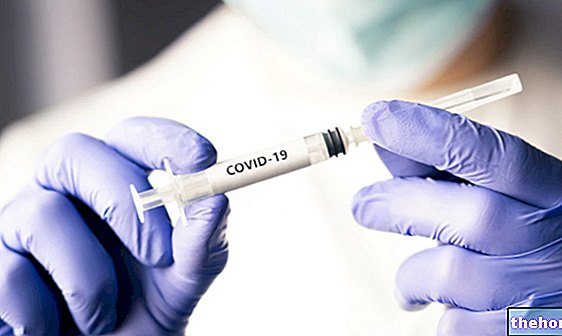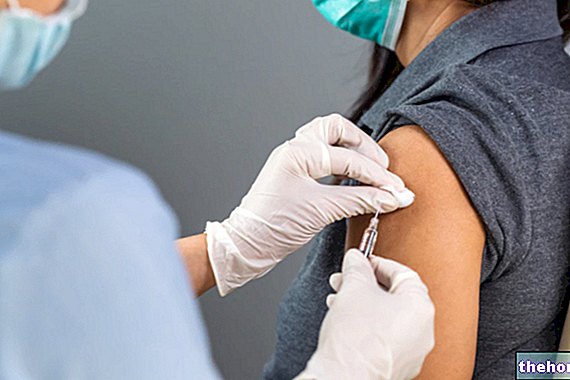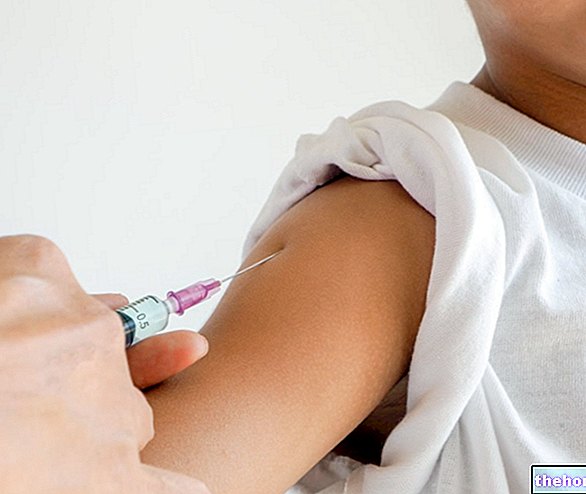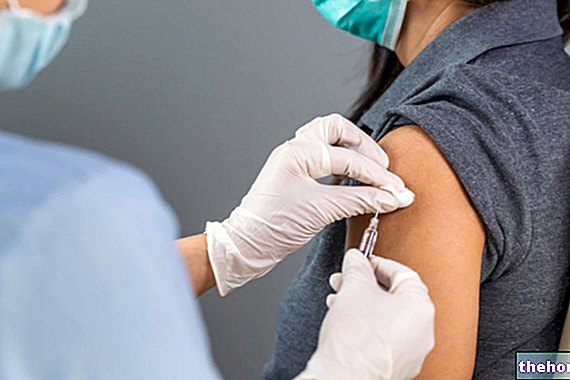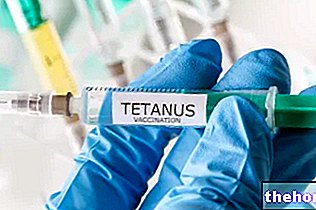
The measles vaccine is mainly for pediatric use; however, it can also be used among adults, if they are not vaccinated and have not yet contracted one of the aforementioned infections.
Belonging to the mandatory vaccines of the pediatric age and available only in MMR and MPRV vaccine preparations, the measles vaccine involves administration by intramuscular injection, divided into two doses; in children, these two doses are dated to the 14th month, the first, and at 5-6 years, the second; in adults, however, they are usually closer together (a period of 4 weeks between one dose and the other is sufficient).
Example of a live attenuated vaccine, the measles vaccine is a drug with reduced adverse effects (the most common are minor clinical disturbances) and effective.
Currently, the measles vaccine is subject to the vaccination obligation established in the summer of 2017; consequently, it is mandatory for all newborns.
Commercially, measles vaccine is only available in combination with mumps, rubella and, sometimes, varicella vaccines, in what are vaccine preparations also known as MMR (Measles-Mumps-Rubella) vaccine and MMRV vaccine ( Measles-Mumps-Rubella-Varicella).
What is Measles: a brief review
Measles is a contagious infectious disease caused by a single-stranded RNA virus belonging to the genus Morbillivirus and to the family of Paramyxovirus.
Before the advent of mass vaccinations, measles represented, together with mumps, rubella and chicken pox, a "typical infection of childhood"; in particular, it mainly affected subjects under the age of 5.
Measles is mainly transmitted by direct contact, via saliva and volatile droplets emitted by coughing, sneezing or speaking; however, it is also possible to transmit it by indirect contact, that is by touching objects contaminated by the infectious agent.
Measles usually starts with a runny nose, sneezing, fever, general malaise, loss of appetite, cough, and fatigue; after which, 3-4 days after the onset of the first symptoms, it causes characteristic brownish-red spots, slightly raised, all over the body.
Measles is an "infection that resolves without particular complications for 70% of patients; in the remaining 30% one or more complications are reported, some of which are very serious from a clinical point of view.
Possible complications of measles include: acute diarrhea (common), otitis media (common), conjunctivitis (common), pneumonia (common), encephalitis (uncommon), meningitis (uncommon), epilepsy (uncommon), strabismus (uncommon) and optic neuritis (rare); some of these complications (eg encephalitis) can be fatal.
Statistics in hand, the subjects most at risk of measles complications are children under the age of 5 and adults over the age of 20.
Measles is on the list of exanthematous diseases.
, so that it is impossible for the latter to produce an infection.
The measles vaccine is a vaccine for pediatric use but not only: in addition to small children, in fact, it could also be indicated for adolescents and adults, in case they were not vaccinated or had never contracted measles (having fallen ill with measles produces an immune memory, similar to that generated by the vaccine, which protects against subsequent infections by the measles virus).
Why Get Measles Vaccine?

The reasons why pediatricians and the Ministry of Health recommend the measles vaccine are different; here are the main ones:
- In both young people and adults, especially if the immune defenses are deficient, measles can degenerate to the point of causing fatal forms of encephalitis, pneumonia or meningitis.
- According to some estimates, before the mass vaccination against measles, measles caused, worldwide, about 2.6 million deaths each year; with the spread of the vaccine, the number of annual deaths from measles has decreased to 122,000 (most of which concern, not surprisingly, areas of the developing world, where vaccination is not widespread).
- Thanks to the further spread of MMR and MPRV vaccine preparations (which include the measles vaccine) between 2000 and 2016, deaths from measles fell by 84%.
When is measles vaccine not needed?
Individuals who have already been vaccinated and all those who have contracted measles in the past do not need the measles vaccine.
and M-M-RVAXPRO, in the MMR vaccine formulation, and Priorix tetra and ProQuad, in the MPRV vaccine formulation.capable of activating the immune system to produce specific antibodies.
In immunology, any foreign substance capable of triggering the immune system is called antigen.
In the case of attenuated vaccines, the antigens are essentially parts of the infectious agent against which immunity is to be created, deprived, in the laboratory, of the ability to cause the actual correlated infection (NB: this is true as long as that the subject is a healthy person, without immune deficiencies).
Antibodies, on the other hand, are proteins that the immune system of the human organism produces whenever it comes into contact with an antigen and which serve to neutralize the latter in the immediate and also in the future, should a second exposure to the same antigen occur.
Thanks to the measles vaccine, therefore, antibodies against measles viruses are created, exploiting parts of the latter that are sufficient to stimulate the immune system, but not as sufficient to cause the associated infectious disease.
.A kind of syringe is used for the administration of the measles vaccine.
Measles Vaccine Dosage

For both young people and adults, the administration of the measles vaccine is divided into two dosages; this means that the patient, whether child or adult, receives the drug preparation on two separate occasions.
The administration of two doses of measles vaccine serves to optimize the effects of vaccination: a single administration, in fact, is not always sufficient to develop "immunity against viruses."
According to the vaccination schedule in force in Italy, for children:
- The first dose is dated between the 12th and the 15th month of life (usually it is performed at 14 months);
- The second dose is dated between 5 and 6 years of life.
However, it should be noted that, if for some reason there is a need for a "faster immunization, the second dose could be dated earlier than the above: the" minimum time interval that must separate the two doses of measles vaccine, in fact , is 4 weeks, for when it is achieved with the MMR vaccine formulation, and 3 months, for when it is achieved with the MPRV vaccine formulation (NB: it is the varicella vaccine that determines this different timing).
As regards vaccination against measles in adolescents (over 13 years of age) and in adults, the administration cycle lasts at least 4 weeks: between the first and the second dose, in fact, at least 28 days must elapse.
Can the measles vaccine be administered together with other vaccines?
Scientific studies have amply demonstrated that the MMR and MPRV vaccine preparation, including the measles vaccine, does not interact with other vaccine preparations; this means that it can be freely administered together with other vaccines.
).However, it should be noted that, most of the time, the adverse effects found are minor clinical disturbances and that the most serious adverse effects are a real rarity.
It should not be forgotten that the risk associated with any type of vaccine, including that against measles, is decidedly lower than the risk behind the infection against which immunization is to be obtained.
So, in essence, the measles vaccine can be considered a safe and convenient drug in terms of risk / benefit ratio.
Did you know that ...
Vaccines are drugs that have passed all full-scale security checks.
The various theories according to which they contained substances dangerous for the human being have been, over time, the subject of appropriate scientific studies, which have amply demonstrated their groundlessness.
What are the Adverse Effects of Measles Vaccine?
There are 4 categories of measles vaccine-related adverse effects: the many common, the common, the uncommon and the rare.
As will be seen, the very common and common adverse effects are minor, if not minimal, clinical complaints.
Very Common Adverse Effects of Measles Vaccine
- Redness and pain at the injection site of the vaccine;
- Mild febrile change;
- Malaise;
- Arthralgia (but only in predisposed adults; it is also more frequent in females).
These are transient disorders, which appear shortly after vaccination and resolve within a few days.
Common Adverse Effects of Measles Vaccine
- Swelling at the injection site (often a combination of redness and pain)
- Fever above 38 ° C;
- Mild skin rash (red spots on the body)
- Upper respiratory tract infection;
- Arthritis (but only in predisposed adults; moreover, it more often affects the female sex).
Some of these disorders appear a few days after the vaccine; also in this case, these are temporary problems, lasting a few days.
In case of fever above 38 ° C, the intake of an antipyretic such as tachipirina is indicated.
Did you know that ...
Skin rash following measles vaccine is observed in 5% of vaccinated subjects.
Uncommon Adverse Effects of Measles Vaccine
- Middle ear infection;
- Swollen lymph glands (glands in the neck, armpit or groin)
- Loss of appetite
- Nervousness and unusual crying;
- Insomnia;
- Redness, irritation and watery eyes (conjunctivitis);
- Bronchitis;
- Cough;
- Swelling of the parotid glands (near the ears)
- Diarrhea and vomiting.
These are disorders that affect 1% of vaccinated subjects.
Rare Adverse Effects of Measles Vaccine
- Convulsions accompanied by fever;
- Allergic reaction to one of the components of the vaccine.
These are clinically relevant disorders, as they can have serious consequences; however, it must be remembered that these are very rare phenomena: according to statistics, they would affect no more than 0.1% of vaccinated subjects.
How to recognize allergic reactions to measles vaccine?
Any allergic reactions to the measles vaccine occur within minutes of vaccination (which is why parents, after administering the preparation, are asked to stay another 20-30 minutes at the vaccine center) and include symptoms and signs such as: hives, breathing difficulties , swelling of the face, tachycardia and / or paleness.
After the measles vaccine, if you have any symptoms or signs of an allergic reaction, you should contact a doctor immediately or go to the nearest hospital.
Does Measles Vaccine Cause Autism?
It has been unequivocally demonstrated that MMR and MPRV vaccines (hence also the measles vaccine) do not cause autism.
The false belief that the aforementioned vaccines are a possible cause of autism is the result of a study conducted in 1998 by Dr. Andrew Wakefield and fully discredited by subsequent research.
For false information published in 1998, Wakefield was expelled from the British medical order, to which he belonged.
The measles vaccine is also contraindicated in pregnant women (who, however, can freely provide for vaccination after the happy event).
When to postpone Measles Vaccine?
The measles vaccine is a practice to be postponed to another date in the presence of a condition characterized by fever or general disorders that the treating physician considers clinically important.
On the other hand, there is no need to postpone it if the recipient candidate has a common cold (however, it is still a good idea to inform the doctor of the present situation).

